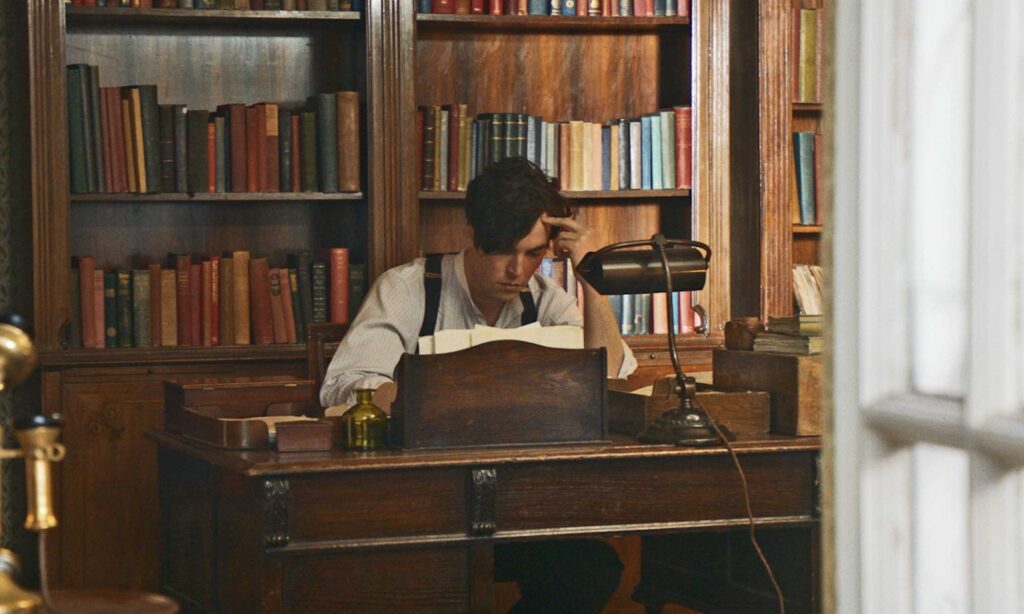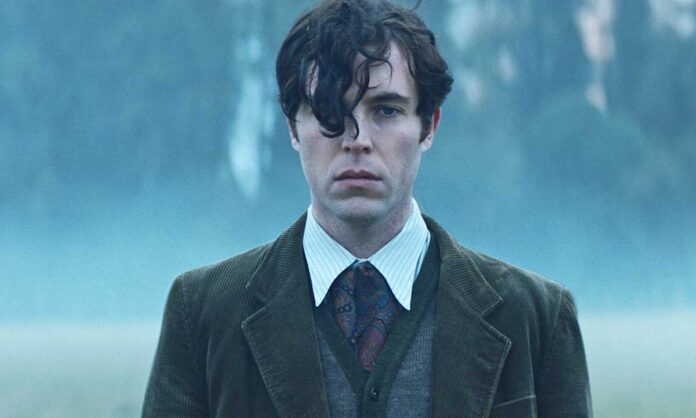“The Laureate,” available January 21 on demand, is a bland, ambitious biographical drama about poet Robert Graves (Tom Hughes). Graves, who was bisexual, may be best known for writing “I, Claudius,” which was published in 1934. He also lived briefly outside New Hope, PA, in 1939. However, none of that information is in writer/director William Nunez’s mediocre film.
“The Laureate” focuses specifically on Graves’ “modern relationship” with two women in the late 1920s — his feminist wife, Nancy Nicholson (Laura Haddock), and Laura Riding (Dianna Agron), an American poet who comes to live with them in Islip, Oxfordshire. The film culminates with him publishing his autobiography, “Good-Bye to All That,” in 1929.
This modest, handsomely mounted period drama sets up the doomed love triangle with a comment by Nancy about not being surprised if the serpent you invite into your home bites you. Laura, is, of course, the serpent, and not to be trusted as she enters Robert and Nancy’s country house, named “World’s End.” Sure, she is bold and vibrant like her stylish blue gloves. She may ingratiate herself by charming the couple’s young daughter, Catherine (Indica Watson), and making a New York breakfast for the family, but she also works at enchanting Nancy by applying lipstick with her fingers on her host’s mouth, or sexually teasing Robert when he adds hot water to her bath. Things get more flirtatious when Nancy, an illustrator, is sketching a female nude, and Laura is prompted to pose and later kiss her. Laura also takes an opportunity to sleep with Robert, who feels ashamed, and does not want Nancy to know of their tryst. It is quickly revealed that his wife apparently conspired and pre-approved the assignation.
“The Laureate” is frustrating because Laura’s motivation for seducing both Nancy and Robert appears to be to get her own work published. Nancy sees Laura as a possible redeemer, but that idea gets lost. There is also a curious and oddly tense scene where Laura almost coaxes Caroline to walk out a window, suggesting a belief in magic that Laura references later, but it feels superfluous. Robert becomes infatuated with Laura because she helps him overcome his writer’s block and his shellshock from WWI. (Nunez shoehorns scenes of Graves experiencing PTSD through the film to emphasize his vulnerability). Laura also makes him a better lover. These reasons may be why Graves advocates for her, but his friends, which include T.S. Eliot (Christien Anholt), and the gay poet Siegfried Sassoon (Timothy Renouf), see right through Laura. [An aside: out gay filmmaker Terence Davies’ yet-to-be released biopic of Sassoon, “Benediction,” brilliantly captures the mental and sexual struggles of that WWI poet; it is what “The Laureate” should have been.]

Nunez’s film is so genteel that there is very little dramatic tension as these events unfold. Agron’s performance is as aggressive as her character. She works so hard at trying to be impressive that viewers may resist Laura’s “magnetism” — and not just because Nancy provides an early spoiler that she is rotten. Laura is unlikeable; she is an agitator, and a phony. Perhaps the film should have been about her. Instead, “The Laureate” asks viewers to accept Robert’s “emotional, spiritual, and physical” attraction to her, but Tom Hughes’s performance as Graves, which is appropriately restrained, fails to engage once he goes gaga for Laura. In contrast, Nancy is the most sympathetic character, and Laura Haddock does her best with a largely thankless role.
Fortunately, in its latter half, “The Laureate” gets more interesting. The film introduces Geoffrey Phibbs (Fra Fee), an Irish poet, who seeks Laura out at a party. Geoffrey comes to live with Laura and Robert in London, and she takes both men to bed at the same time — though the men do not touch or kiss, which might have been interesting. Laura also hires Elfriede (Meriel Hinsching), a German secretary, who has sex with Robert. Laura does this because she is apparently tired of Robert, and desires Geoffrey for herself. (He is handsome, but her reasons for wanting him are otherwise unclear.) However, when Nancy comes to visit — thinking Laura wants to be with her — she realizes the truth about her lovers and moves to a houseboat to be alone. (Catherine is sent to live with a relative). Geoffrey soon comes to court Nancy, and their unexpected affair has an impact on Laura and Robert that brings the story to a head.
To Nunez’s credit, the film never gets soapy as things play out, but it is also far too chaste. The film talks about passion but contains no real heat. The trio’s “modern relationship” is supposed to rail against conventional society but these ideas are mentioned without being discussed. The film generates a shrug rather than any real emotion.
Graves’ life is certainly ripe for a biopic, and it is a shame that “The Laureate” feels like a missed opportunity. Nunez’ film is far too basic to merit much attention.
